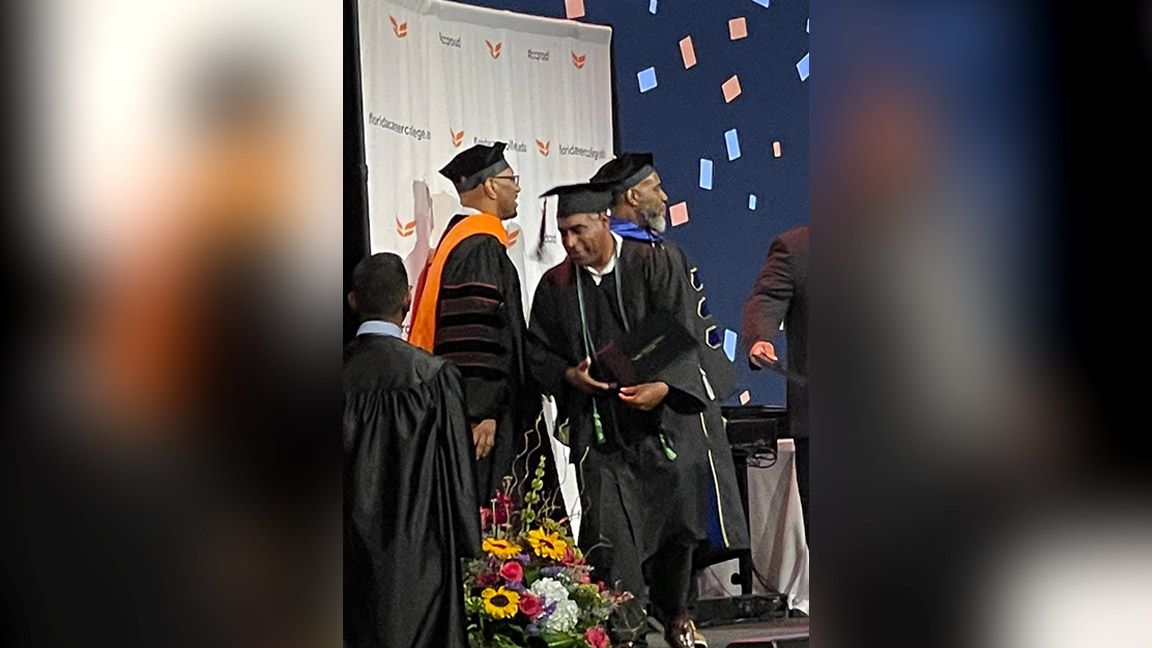LONGWOOD, Fla. – After four years of living on Orlando’s streets, Hendricks Reyes had just about lost all hope – until one cold day, when he received what he believes was a sign from God.
After getting his bike stolen, ripping his shirt and getting stuck in the cold, pouring rain, Reyes says he broke down in the parking lot where he’d been living, begging for a sign.
“I got on my knees in the middle of the parking lot crying, and said, ‘God, you know what, I’m tired of you. I’m done,’” Reyes said. “If you’re real, then you reach out and come and get me. If not, I’m done. You don’t exist.”
The next morning, Reyes says, he woke up to see a man putting up a big billboard in the parking lot. When Reyes asked, the man said a church would soon be built there.
“My mouth just dropped. I was in a state of shock,” Reyes said.
Today, Reyes is a greeter at that same Journey Church in Fern Park. Formerly a high school dropout, Reyes is also a college graduate now, with his own place to live. It’s worlds different from the life he once knew: hungry, living out of a bag, constantly afraid his few precious items would be stolen. Once, someone even stole the little urn he carried with his father’s ashes; Reyes says he was depressed about it for months.
Although he’s not homeless anymore, Reyes still can’t shake the memories, or his empathy for all the people who still are. That’s why now, Reyes solicits donations and gives them to homeless people at places like Lake Eola Park. Once a month, he does it with other Journey Church members, but most of the time Reyes hands out shoes, pants and other necessary clothing and food items all on his own.
The unhoused people Reyes meets are grateful for the donations. But more than anything else, he says, they’re happy knowing someone genuinely cares about them.
“In general, what they really need is just somebody to acknowledge them. Somebody to treat them like a human being, and not approach them with pity,” Reyes said. “Just: ‘how you doin’, sir?’ … You’re not invisible. I see you.”
Cracking the forcefield
Homelessness can be an incredibly isolating experience, Reyes says.
“You create a world, a forcefield where it’s just you,” Reyes said. “It becomes human nature. You get used to not talking to anyone, until someone cracks that forcefield.”
For Reyes, Journey Church was one huge part of cracking his forcefield. The Sharing Center in Longwood was another. There, Reyes says, staff earned his trust, keeping him focused on his faith and proving to Reyes over time that they were “for real.”
“They asked, ‘what do you need?’ I said I need an opportunity to get myself out of this situation,” Reyes remembered. “And if you give me that, I guarantee I won’t fall again.”
So far, Reyes has succeeded. But as The Sharing Center’s director of marketing and innovation Margaux Pagán points out, it’s rare to find a linear path out of homelessness.
“There’s never really a point of, ‘okay, I’m done,’” Pagán said. “This is a poverty journey. And it’s much like you can imagine recovery from anything else. Sometimes you’re going to take steps backwards. Sometimes the unknown is going to happen.”
That unpredictability is exactly why Pagán says The Sharing Center decided to create its new workforce development program, Project RISE (Reach, Inspire, Sustain and Empower). Tentatively slated to launch in June, it’s a cohort-style program, designed to help transition people from poverty and/or homelessness into a state of economic stability: one that’s sustainable permanently, not just in the short-term.
“We want to become the place where, no matter where you are on that journey, you have a place to come,” Pagán said.
“Storms don’t last forever”
Sharing Center staff dreamt up Project RISE amid the coronavirus pandemic, Pagán says, during discussions about the nonprofit’s mission. For much of its 35-year history, The Sharing Center has focused on providing essential resources – like food, clothing and showers – to people in need of immediate help. While that’ll still continue to be part of the group’s work, Pagán says, The Sharing Center now has a renewed focus on long-term stability for the people it serves.
“We did not have to be a Band-aid. We could be, and contribute to, an actual solution,” Pagán said, recalling The Sharing Center’s brainstorming sessions.
Project RISE will provide participants with whatever wraparound services they need, Pagán says: including food and housing assistance, mental health care, help getting identification cards and job skills training. Programs rooted in these types of supportive services cost money, but research shows they’re usually wildly more successful – and less expensive – than the emergency health facilities and jails homeless people often wind up instead.

Right now, Sharing Center outreach staff are visiting local homeless encampments, looking for Project RISE participants. Staff are also confirming stable, reliable employer partners who are open to hiring Project RISE graduates – even if their backgrounds aren’t crystal clear.
“We’re working a lot right now to build that network, if you will, around our folks, so that when they finish the actual four weeks of the program here on our campus, they can go directly into a job that’s already been committed for them,” Pagán said.
Already a one-week pilot version of Project RISE for incarcerated women has wrapped, with 11 women successfully completing the program, Pagán says.
Reyes, who recently graduated Florida Career College with a 3.9 GPA, still keeps in touch with Sharing Center staff. One February morning, he stops by to chat with other visitors using the essential services: like Orlando Irizarry, one of many homeless, working people in the region.
“This is just a storm that you’re going through right now,” Reyes told Irizarry. “Storms don’t last forever, and the sun will shine.”



